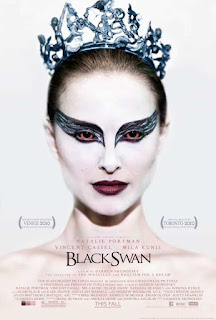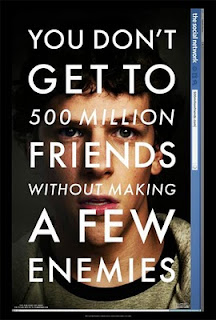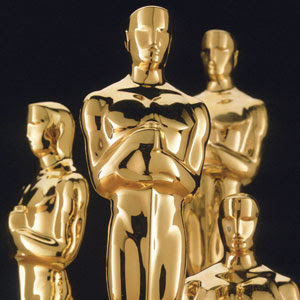
Ugly Duckling or Swan Queen?
12/13/10
Warning: Contains Spoilers!
“The Return of the Repressed” is a phrase first introduced by Sigmund Freud and is now often thrown around in the discourse surrounding Horror Films. Freud’s theory, earliest applied to Hitchcock’s’ films, is the notion that anything a society or an individual represses will return as the monster and torment the subject. In Darren Aronofsky’s latest film, The Black Swan, the monster appears in a number of manifestations as what the main character, Nina Sayers (played by an impeccable Natalie Portman), has repressed.
In this film, Nina is the Prima Ballerina at the New York City Ballet. She has been crowned Swan Queen in the company’s season opening production of Swan Lake. In this new risqué version of the show, she will not only be playing the virginal White Swan, but also the more tempestuous Black Swan. Throughout the film, her artistic director pushes her to let herself and her self imposed restraints go in order to embody the characteristics of the Black Swan, as she inherently excels in the role of White Swan. Throughout her life Nina was constantly tormented by an obsession for perfection. She therefore disallows herself any physical pleasure or emotional displays which might take away from her quest for perfection. Be it sexual pleasure, or even something as simple as enjoying a piece of cake, she lives a controlled life unable to enjoy anything around her, even her success. Her mother, with whom she lives, cares for her as she has since childhood, reinforcing the restraint Nina puts on herself. Each night she undresses Nina, takes out her hearings for her and tucks her into bed before leaving her music box ballerina playing her to sleep. Any sense of adulthood or independence has been completely repressed and her mother is the external force driving that repression, as if Nina needed any more encouragement to be controlled.
From the instance that she is awarded the lead role, Nina’s descent from simple OCD ballerina to complete madness is made clear. She feels as though she must prove herself worthy of this position, and not only that, but she must keep any would-be lead ballerinas at bay. Everyone is competition. The introduction of a new ballerina, Lily (Mila Kunis), catalyzes her madness as Nina does not know if she should trust her as a friend or suspect her as someone who is vying to replace her. Lily ultimately becomes the focal point of Nina’s paranoia as she considers her to be the one who will be the biggest threat of dethroning her from her position. Even as the film comes to a close, the audience is left wondering, how much should we believe about Lily’s behaviors? Nina has positioned Lily to be hypercompetitive and a real threat, but is that actually true?
Nina’s madness manifests itself in a number of ways, most obviously in her almost constant paranoia of those around her. Aronofsky skillfully plays with the audience’s sense of reality by a constant focalization on Nina (she is in every scene). As Nina is the clear center of the film, and is in every single scene, there’s an almost naïve sense of trust we place on her as our narrator. Harkening back to films such as Fight Club and Memento, Black Swan leaves the audience questioning what they can trust and what existed within the diagesis of the film. As the film comes to its end, there are events left ambiguous and we are left questioning which scenes we should trust and which were just Nina’s psychosis rearing its ugly head.
Further, through the use of camera tricks and other means of visual deception, he creates a world in which what the audience sees ultimately proves to be untrustworthy, something jarring for a movie viewer who has been trained by cinema to trust what he sees on screen. Nina often imagines people who end up not really being there and often thinks she sees herself on others’ bodies. The real question turns out to be though, when does she see other people acting out certain behaviors that turn out to be her? A crucial scene between Nina and Lily turns out to be the one which alerts Nina to this possibility as she both the audience and the character herself begin to distrust what is being seen.
Moreover, the prevalent use of mirrors throughout the film offers a visual display of how Nina wishes she could reflect her self image towards others. Moreover, overlapping and broken mirrors offer a visual sense of the fragmented personality Nina devolves into, constantly wishing to be able to keep her life together but being unable to do so.
As mentioned, Nina spends a great deal of time repressing some of her deepest desires. One repression which is made quite clear is her sexuality. Her artistic director, Tomas (Nicholas Cassel) continually pushes her to let herself go and embrace her sexuality, even suggesting at one point that she go home and touch herself. While he does push some boundaries between teacher and student, he also recognizes that the role of the Black Swan requires a sense of sexual freedom. Nina has a hard time allowing herself to give into any of the urges which she has fought so hard to repress to let herself reach her ultimate goal of perfection. In the world she has created for herself (and her mother has encouraged) giving into desires and growing into a free thinking adult is a sign of imperfection and weakness. Even in the rare instances which she does give in to her desires, they result in utter humiliation, further pushing her into a continuance of the repression.
Nina's psychological repression physically manifested itself with Nina's scratching habit. Over the course of the film the audience comes to learn that she has had a chronic struggle with scratching at her back, often resulting in rashes and bleeds. Despite her mother best efforts at stopping this habit, buying expensive cover ups or tying socks on her hands while she slept, Nina persisted. Her scratching ultimately came to represent her desire to let her repressed traits come out. Ironically, it was those repressed traits which led to her success as the Black Swan. This literally becomes the case when she begins to imagine her skin crawling with barbs and other maladies that she must pull out. Nina succumbs to the scratching and allows herself to give in to that one desire. What results is an unexpected transformation. The Black Swan Queen is the embodiment of sexual freedom and it was only once she let herself go and gave into her desires for which so long she saw as imperfection was Nina able to literally embody her character and perform the Black Queen perfectly.
On a separate, but related note, the idea of beauty and what makes something beautiful was constantly in my mind as I watched this film. Ballet is supposed to be an embodiment of one of the most beautiful acts the human body can create. However, this film shows the dark underbelly of ballet and how so much of this goal of external beautiful perfection is born from such an ugly place of private and individual pain and suffering.
Like any student of Freud or film knows, however, that the harder one represses something, the more forcefully it will return. This is especially true with Nina. In her quest for ultimate perfection she mistrusts anyone around her and sees them as a monster who needs to be defeated. This idea culminates in the last few scenes of the film. In the climactic final scenes Nina sets out to destroy the one person who can and will take her place as lead ballerina. A dramatic and bloody fight ensues with Nina feeling satisfied that she has been left invulnerable from defeat and that she has achieved her goal of perfection, with little concern for the long term consequences.


